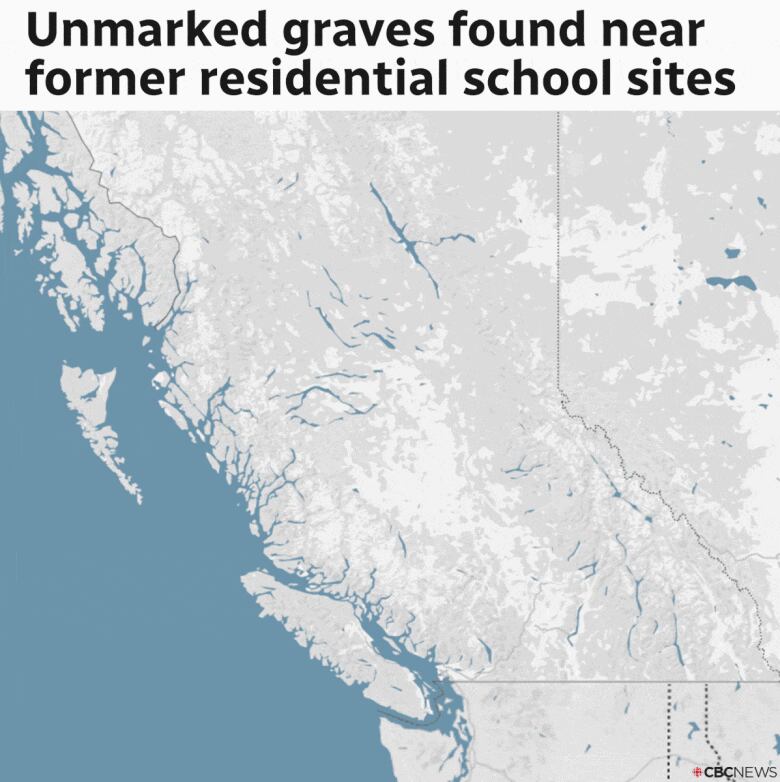182 unmarked graves discovered near residential school in B.C.'s Interior, First Nation says
Ground-penetrating radar used to search near aqam cemetery, St. Eugene's Mission School: Lower Kootenay Band
WARNING: This story contains distressing details.
A First Nation in B.C.'s South Interior says 182 unmarked grave sites have been discovered near the location of a former residential school.
The community of aqam, one of four bands in theKtunaxa Nationand locatednear the city of Cranbrook, B.C., used ground-penetrating radar to search a site close to the former St. Eugene's Mission School, the Lower Kootenay Band announced Wednesday.
In a statement, the aqamband said it began searching the area for burial sites after finding an unknown, unmarked grave during remedial work around theaqamcemetery last year. The cemetery is adjacent to the former school.
Preliminary results from that investigation found 182 burial sites. The statement saidthegraves were shallow about a metre deep and within the cemetery grounds.
The community saidwork has begun to identify whether the graves are those of children who were forced to attend St. Eugene's.
"aqamleadership would like to stress that although these findings are tragic, they are still undergoing analysis and the history of this area is a complex one," the statement read.
The finding adds to the growingtally of unmarked burial sites discovered near or adjacent to residential schools in preliminary scans across Canada overthe past month, including 215in Kamloopsand 751 in Saskatchewan.
"You can never fully prepare for something like this," said Chief Jason Louie of the Lower Kootenay Band, which isa member of the Ktunaxa Nation.
St. Eugene's Mission School was operated by the Catholic Church from 1912 until1970. The buildinghas since been converted into a golf resort and casino owned by theKtunaxa Nation.
The Lower Kootenay Band saidup to 100 of its members were forced to attend the institution.
"It is believed that the remains of these 182 souls are from the member bands of the KtunaxaNation, neighbouring First Nations communities and the community of aqam," read a media release from the band.
'It's very difficult'
Louie said the nation's leadership met with residential school survivors in the community before announcing the discovery and referred them to support.
"It's very difficult," he said."It was very impactfulwhen we got the news of the 215 souls that were located in Kamloops. And now it's very, very personal."
The band saidit is in the early stages of learning about the report's findings and willprovide more updates.
Theaqamcemetery was established by settlers in 1865. It was used to burylocal residents who died at the St. Eugene Hospital after the hospital opened in 1874.
The community ofaqambegan burying its members there in the late 1800s, according to the statement.
Graves were traditionally marked with wooden crosses, which can deteriorate over time due to erosion or fire and result in an unmarked grave.
"These factors, among others, make it extremely difficult to establish whether or not these unmarked graves contain the remains of children who attended the St. Eugene Residential School," the community's statement said.
Chief wants church held accountable
Louie said he wants the Catholic Church to be held legally accountable for operating the institution.
"We were robbed of future elders," he said."Those children, if they had not passed away, could have been elders and teachers in our communities, the keepers of knowledge. It's devastating."
Bob Chamberlin, former vice-president of the Union of B.C. Indian Chiefs, said theneed formental health services will increase, as more discoveries will further traumatize residential school survivors.
"This is not something that you casually set aside and carry on with your days," he said.
"It's something that's heavy on the hearts of First Nations people and stays in the mind as we go through our days. There are many people that are going to be struggling to a great degree."

Supportis available for anyone affected by their experience at residential schoolsand those who are triggered by these reports.
A national Indian Residential School Crisis Line has been set up to providesupportfor residential school survivorsand others affected. People can access emotional and crisis referral services by calling the 24-hour national crisis line: 1-866-925-4419.
With files from Yvette Brend and Sarah Penton













_(720p).jpg)


 OFFICIAL HD MUSIC VIDEO.jpg)
.jpg)



























































































